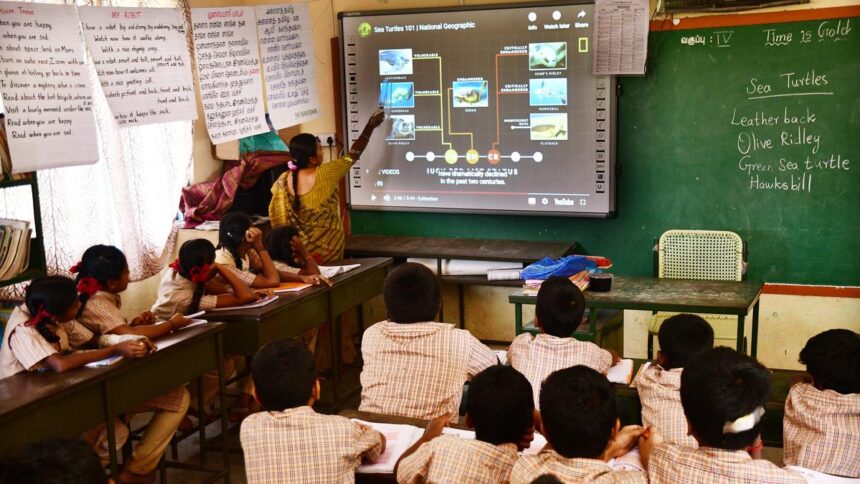[ad_1]

Representational image. File
| Photo Credit: S. Siva Saravanan
Works are under way to establish smart classrooms equipped with broadband connectivity in as many as 20,000 panchayat union primary schools and to establish hi-tech laboratories with similar Internet connectivity in 6,992 panchayat union primary schools across Tamil Nadu, the Director of Elementary Education (DEE) has informed the Madras High Court.
Appearing before the first Division Bench of Acting Chief Justice R. Mahadevan and Mohammed Shaffiq, State Government Pleader A. Edwin Prabakar placed a communication received from the DEE stating that steps had also been taken to provide computer tablets/tabs to 79,500 teachers handling primary classes right in the beginning of this academic year.
The intention behind the distribution of tabs was to enhance the learning and teaching experience in primary schools, the DEE said in response to a public interest litigation (PIL) petition filed by advocate P. Pugalenthi, through his counsel M. Radhakrishnan, for upgrading all the government primary schools in Tamil Nadu into schools of excellence.
The Director went on to state that the State government had been implementing various schemes in order to enhance the quality of education imparted in 30,744 government primary and middle schools. He said, new classrooms had been constructed in 2,547 panchayat union primary and middle schools at a cost of ₹800 crore allocated by the Rural Development and Panchayat Raj department in 2022-23.
Similarly, for the academic year 2024-25, it had been decided to construct 1,920 additional classrooms, 251 laboratories, 692 toilets for male students, 646 toilets for female students and 20,093 meters long compound walls in 794 panchayat union primary and middle schools, across the State, under the Professor Anbazhagan School Development Scheme, the DEE added.
He said, the funds for the constructions had been drawn through National Bank for Agrictulture and Rural Development and the School Infrastructure Development Scheme. Steps were underway to commence the civil works. Further, the syllabus was also being revised as per global requirements and the recommendations of State Council of Educational Research and Training (SCERT), the DEE said.
SCERT was also conducting training programmes for the teachers as well as the headmasters and headmistress on developing leadership skills, the officer said. He also said that as many as 5,429 primary and upper primary schools were sanctioned for Tamil Nadu under the Sarva Shiksha Abhiyan between 2001-02 and 2017-18 and that all those schools had been established in the State.
After perusing the DEE’s communication, the Acting Chief Justice asked the State GP to file the details by way of an affidavit within two weeks. He also asked the petitioner’s counsel Mr. Radhakrishnan to go through the DEE’s communciation and come up with his additional suggestions, if any, on enhancing the quality of education in the government schools.
In his affidavit, the PIL petitioner had stated that the government need not pay crores of rupees every year to private schools for the admissions made by them under the Right of Children to Free and Compulsory Education (RTE) Act of 2009 if all government schools in the State were upgraded as schools of excellence having facilities on a par with private institutions.
His counsel brought it to the notice of the court that even the RTE Act mandates State governments to establish neighbourhood schools within three years and the stipulations prescribed for such institutions required them to be schools of excellence. However, the failure of the government to establish such quality institutions had forced most parents to admit their children in private schools under the RTE Act, he complained.
The government had to reimburse the fees for the children admitted in private schools under the RTE Act and the amount ran to several hundred crores of rupees, the counsel said and insisted that the money could instead be spent better on establishing government schools of excellence.
[ad_2]
Source link







